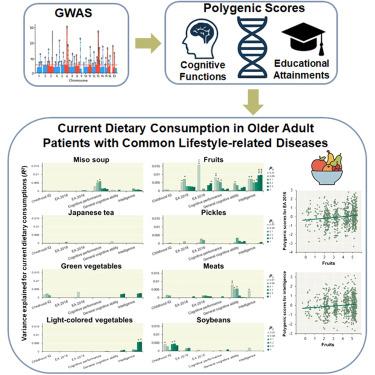受教育程度和认知功能的遗传因素对当前饮食消费的影响
IF 4.1
2区 综合性期刊
Q1 MULTIDISCIPLINARY SCIENCES
引用次数: 0
摘要
饮食习惯对于预防和管理身体和精神疾病至关重要,也可能受到教育程度和认知方面的遗传因素的影响。本研究探讨了与EA和认知相关的多基因评分(pgs)对患有生活方式相关疾病的老年患者当前饮食消费的影响。研究人员对730名被诊断患有或疑似患有生活方式相关疾病的老年门诊患者的饮食习惯进行了8类评估。使用大规模全基因组关联研究(GWAS)数据集计算了与EA和认知相关的6个pgs,并研究了它们与饮食消费模式的相关性。与EA和认知相关的高pgs通常与水果消费量增加相关。此外,在一个独立的队列中,我们发现水果消费量与EA和认知功能之间存在正相关的遗传关系。我们的研究结果表明,与教育和认知表型相关的遗传因素可能会影响饮食习惯,从而促进身心健康和长寿。本文章由计算机程序翻译,如有差异,请以英文原文为准。

Influences of genetic factors for educational attainment and cognitive functions on current dietary consumption
Dietary habits are critical for the prevention and management of physical and mental disorders and may also be influenced by genetic factors for educational attainment (EA) and cognitions. This study examined the effects of polygenic scores (PGSs) associated with EA and cognitions on current dietary consumption among older patients with lifestyle-related diseases. Dietary habits were assessed across eight categories in 730 older adult outpatients diagnosed with or suspected of having lifestyle-related diseases. Six PGSs associated with EA and cognitions were calculated using large-scale genome-wide association study (GWAS) datasets, and their correlations with dietary consumption patterns were investigated. Higher PGSs associated with EA and cognitions were commonly correlated with increased consumption of fruits. Moreover, we found positive genetic correlations between fruit consumption with EA and cognitive functions in an independent cohort. Our findings suggest that genetic factors related to educational and cognitive phenotypes may shape dietary habits that promote physical and mental health and longevity.
求助全文
通过发布文献求助,成功后即可免费获取论文全文。
去求助
来源期刊

iScience
Multidisciplinary-Multidisciplinary
CiteScore
7.20
自引率
1.70%
发文量
1972
审稿时长
6 weeks
期刊介绍:
Science has many big remaining questions. To address them, we will need to work collaboratively and across disciplines. The goal of iScience is to help fuel that type of interdisciplinary thinking. iScience is a new open-access journal from Cell Press that provides a platform for original research in the life, physical, and earth sciences. The primary criterion for publication in iScience is a significant contribution to a relevant field combined with robust results and underlying methodology. The advances appearing in iScience include both fundamental and applied investigations across this interdisciplinary range of topic areas. To support transparency in scientific investigation, we are happy to consider replication studies and papers that describe negative results.
We know you want your work to be published quickly and to be widely visible within your community and beyond. With the strong international reputation of Cell Press behind it, publication in iScience will help your work garner the attention and recognition it merits. Like all Cell Press journals, iScience prioritizes rapid publication. Our editorial team pays special attention to high-quality author service and to efficient, clear-cut decisions based on the information available within the manuscript. iScience taps into the expertise across Cell Press journals and selected partners to inform our editorial decisions and help publish your science in a timely and seamless way.
 求助内容:
求助内容: 应助结果提醒方式:
应助结果提醒方式:


